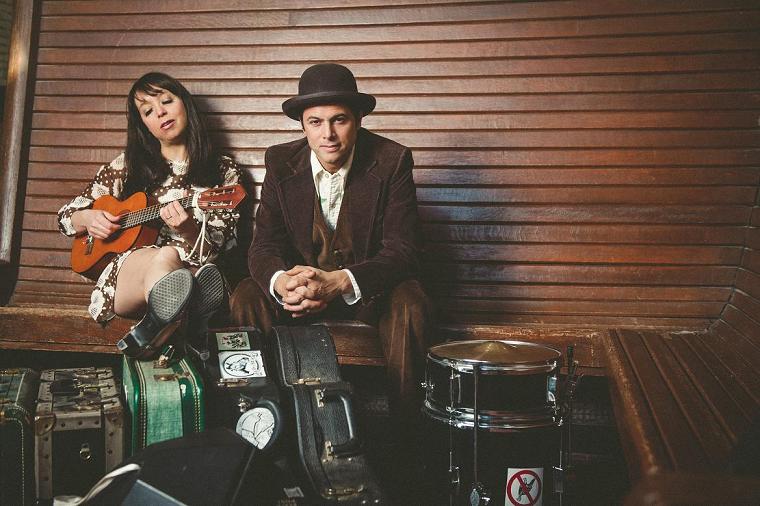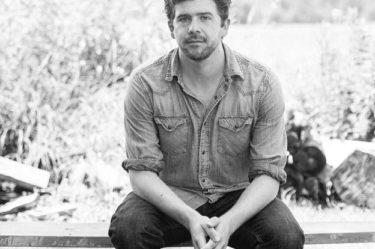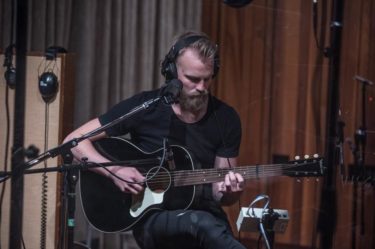Interview: Mike + Ruthy
One of the most vibrant and thrilling Americana albums of 2015 came from the New York-based husband-and-wife duo, Mike + Ruthy, with their release, Bright As You Can. The pair pay homage to folk music’s finest while imaginatively constructing a path that’s uniquely their own. Deeply embedded with roots elements sprinkled with flavors of Motown and R&B, the record offers a robust collection of invigorating and diverse tunes. Ruthy’s commanding and distinctive voice and Mike’s compelling storytelling create innovative and memorable songs resulting in a chemistry that’s undeniable.
In this conversation, the couple discusses their contrasting songwriting techniques, why they include their children in all their artistic endeavors, and whether a song is ever truly finished.
Laura Antonelli (Songfacts): Can you describe the best writing dynamic that works for the both of you?
Mike Merenda: Between us as collaborators, or just as individuals?
Songfacts: Both. You can start with either one.
Mike: I’m still doing the same approach to songwriting that I took as a 13-year-old kid, which is finding a place where I’m completely alone and then just fishing songs out of the ether. It’s still my favorite way to do it.
I’m stubborn when it comes to actually collaborating with others, and especially in the formative stages of a song when it’s just coming together. One of my favorite experiences as a person is just to find the song on my own. But now that we have two kids, it’s harder to find that completely separated alone time. I seem to seek it out in little shards and write a song as soon as the opportunity arises.
Once I have my songs, they take a little longer now to finish because I don’t always have the time to sit there and get it across the finish line in one sitting, but that’s where the collaboration with Ruthy is most valuable. We often help each other get the song from 75 percent to 100 percent done. We’re good finishers and sounding boards for the work that we’ve created on our own. It seems to be how our relationship as songwriters has evolved. We’re the finishing touch experts for each other.
Ruthy Ungar: Yeah, that makes sense.
Songfacts: You’re the same way, Ruthy?
Ruthy: No [laughs]. Mike, his muse comes when he’s by himself, but for some reason songs occur to me in a busy, bustling New York avenue more than when I’m by myself. I’ve written a lot of songs while walking in the city or while driving with the radio on and NPR news is blaring in my ear. I don’t know why, but it just seems I’m stimulated differently to write or to come up with ideas. That’s not to say I don’t sometimes like to sit down with just me and a piano or a guitar and write something.
But as far as collaboration, I do agree. It’s fun when you have a song that you’ve essentially written but it’s not done or it needs a bridge or another verse – that’s when it’s the most fun to collaborate. I don’t think either of us have ever sat down in a room and done the collaborative songwriting thing where it was from zero. But both of us have iPhone voice memos and notebooks filled with pieces of songs that we like or just haven’t had the chance or time to finish.
The past couple of years, I’ve come up with little exercises for writing songs. One of them I invented for a class. I taught a songwriting class at a ukulele weekend where the classes were pretty diverse and all different types of playing the uke. I thought, “Wouldn’t it be fun to do a songwriting on the uke class?” I just came up with this idea of writing a stream of consciousness using the alphabet. It was some kind of dorky songwriting game that would make you start and come up with ideas. Of course, I tried it and wrote a song that I really like.
What Mike and I do agree on is that the only way to write a song is to write a song. No two songs are necessarily coming from the exact same process. There’s no right or wrong way. You just have to be 100 percent flexible to the way it’s happening when it’s happening. If it’s not happening, try something else.
Mike: Yeah, because people do ask us all the time, “How do you write a song?” The only answer is just to do it. Whatever removes the obstacles from it happening is the right path.
It’s always for me strumming a guitar, or more recently a banjo, on my own. I just enjoyed that so much as a kid. It was the key to an unknown utopia. Playing an instrument by myself was so unique because I didn’t grow up with musicians in the house. So all of a sudden, I went from a kid who listened to the radio to a kid who could access this world that I didn’t think was accessible to just normal people. But it turns out it is, and all you need is a couple of chords and there you are.
Songfacts: Let’s talk about your latest release, Bright As You Can. The vocals vary on it. Mike, you sing lead on songs such as “Chasin’ Gold” and “Cigarette” and then, Ruthy, you sing on other songs such as “Freckled Ocean” and “Goin’ Out.” And then you both sing simultaneously together on songs such as “What Are We Waiting For” and “The Farmer.” How do you decide who sings what vocal parts?
Mike: Generally, the person who wrote the song is going to sing lead. Although, of course, there are exceptions to that.
Ruthy: The only exceptions are ones where Mike writes the song for me to sing. I don’t think I’ve yet written a song for you to sing, have I?
Mike: Yeah, you should do that. It’d be fun.
“Rock on Little Jane” is a good example of something that just came out of the ether that I wrote. It just seemed like it was tailor-made for Ruthy to just go deep with it. She shines in that retro Motown or old country motif. She’s just so good at accessing that place with her vocals. I don’t know where the song came from – I never do – but I wasn’t going to be the R&B singer on it. Ruthy can do that, so it wasn’t calculated. It just appeared: Wouldn’t this be good for someone who can do something like that? Oh, I happen to be married to that person.
I wrote “Bright As You Can” but then Ruthy helped me. We rewrote it together. I probably had it there and then Ruthy definitely made it better. It’s the type of song that’s right in her wheelhouse. So those are a couple of examples of something that I generated that just seemed to fit much better for her as a performer.
I would also say Ruthy is a singer, whereas I’m a guy who learned how to sing. So if there’s a song that is maybe a little more demanding or can do more in the hands of someone more capable, it’s a good idea to create an arrangement where Ruthy can sing the song. She’s a powerhouse singer and sometimes that’s what you want in your show is those showstoppers. She tends to deliver those much more frequently and more effortlessly than me.
I think where I shine is the guy whispering in the corner a bunch of lyrics that are strung together in a way that is unique. It’s always been my forte: “What is that kid saying over there?” Lean in a little closer and like, “Who is that guy?” But I’m not the guy who’s ever pointed out as the best singer in the room or the guy who’s going to solicit the standing ovation. I’m more of just the shy kid in the corner who has a lot to say [laughs]. That’s how I see myself.
Ruthy: I don’t know about shy. You’re a words guy.
Mike: Yeah, I’m a words guy, she’s a chanteuse, and there we are.
Ruthy: And sometimes people compliment me on my “pipes” [laughs].
Songfacts: Well, you do have great pipes.
Mike: People are always asking me, “What does your band sound like? What does your music sound like?” Why is that the hardest question to answer? But I feel it’s like Bob Dylan married to Nina Simone, somewhere in there – the guy who strings the words together who takes great pleasure in that and the woman who can just throw her head back and it just mellifluously flows from a place of effortlessness. That’s Ruthy.
Songfacts: You already mentioned it, but let’s discuss the first song, “Bright as You Can.” What inspired that one and why did you name the whole record after it?
Mike: When I’m not just hoisting my antenna and seeing what’s up there for writing a song, another thing I’ve started employing is thinking about the show because we do tour full time. It’s our career and it’s our livelihood. So sometimes I think, “What is our show missing? What sort of feel, energy, and tempo? What would be fun to be presenting?” I sometimes approach a song that way.
It’s such an infectious feel – that fast, driving, fall on the floor – I guess people call it a bluegrass feel. But a rock and roll/bluegrass feel is something our old band, The Mammals – I don’t want to say developed because we weren’t the first to do it, but playing old-time string band music with a drummer was unique and still is now. It was a sound that we stumbled on with a traditional theme called “Fall on My Knees” that we used to close every concert. I usually don’t take such a crass approach like that but my thought was, God, wouldn’t it be great if Mike + Ruthy had a song like “Fall on My Knees” that just kicked ass and could close every concert and just stake our ground like that traditional song did for The Mammals.
So I entered the portal via that feeling. I started playing that feel and seeing what I could find in that feel, and it ended up being “Bright As You Can.” But in a sense, it was like ripping off ourselves. We used to be known for doing this, so let’s do that again [laughs].
Ruthy: I think what Mike’s saying is that part of songwriting is the music part. We wanted to have this particular groove and energy. Sometimes Mike writes a song with just that in mind. It’s kind of new. He didn’t used to do that so much five years ago.
Mike: It’s more and more lately. Five years or maybe even more because “Bright As You Can” is probably five years old at this point. Honestly, even though it’s on our new record, it was written around 2010. I used to be much more stubborn about just letting the song be what it is, wherever it came from, unadulterated by my concepts of how it’ll fit into a setlist or something like that. But anything that brings you to the table to find a song is the way to go. So I’ve tried to remove the obstacles and barriers as the years have ticked on.
The idea of people in Nashville being like, “Let’s get together and write,” it used to just make my stomach turn. How could anybody really approach songwriting that way? But why should I cross anything off the list? Any approach is valuable and I’m trying to keep a much more open mind as I get older about it, and file that under the same category.
Songfacts: And why did you decide to name the record after it?
Mike: We did wrestle with that for a long time. We had 20 songs recorded in that session and the record could have gone a few different ways. I guess thematically and feel-wise it could have been a much mellower, late-night sounding record if we chose more of those types of songs. But one of our goals with this record was to keep things festive and celebratory and to create music that would play well on bigger stages, like festival stages.
Our old band, The Mammals, used to clean up at festivals. Since we downsized to a duo, even when we were occasionally doing full band shows and it was called Mike + Ruthy, the perception was that we were smaller and playing more intimate shows. So we found that it was harder to get back on the festival circuit.
We said in a calculated way, “Let’s make a record that appeals to the festival scene and a repertoire that is well suited for a big stage.” It meant getting the band together and a lot of things, but of the songs that we had to choose from Bright As You Can just seemed to be the through-line. It was the stick-to-iveness. It was the journey. It was the way that it plays against the darker songs like “Cigarette.” It just holds that up to any of the songs on the record. “Chasin’ Gold,” “Golden Eye” – they were all laced with some sort of light that was either being smothered and trying to get through or light that was shining brightly. It just seemed like the perfect header for this body of work.
Songfacts: In “Bright As You Can,” the song begins with the lyrics, “Well, my mother, she once told me, you got to be as bright as you can. My father, he once told me, you got to be as strong as you can.” And the album ends with the song “When the Sun Comes Around” and it starts with the lyrics, “Don’t hold me Momma, don’t me scold me Poppa, I’m just a woman with a broken heart.”
Mike: Wow. Very astute.
Songfacts: Is there a story or correlation between those two songs and did you place them in those spots on purpose?
Ruthy: Well, in a sense. When they were written there was no correlation or concept. I find the whole mother/father language in songs can be a little overdone and a little bit of a cliché in a way [laughs]. It is very astute that you noticed that.
The way we placed them on the record was definitely purposeful in that having “When the Sun Comes Around” on the record at all was in debate. That one and “Cigarette” seem like they may be from some after party album or some other moody album. But we decided to put them on and I’m so glad we did because those two are both requested at shows. They are a lot of people’s favorite songs and do provide a lot of different texture for the record. So I’m glad they’re on there.
When we put “When the Sun Comes Around” last, I liked the way that when the record loops back to the top at the end of “When the Sun Comes Around” you hear the beginning of “Bright As You Can,” and to me that’s how they connect. I love hearing “When the Sun Comes Around,” which is at its core supposed to be an uplifting song, but from a depressed place. So here I am in the doldrums knowing that eventually the sun will shine. When you get to the end of that and then immediately hear a pumping energy in “Bright as You Can,” which is basically a mantra of staying positive and taking lessons where you can find them.
So I love how they sit together in that order. It makes me want to hear the whole record again because it loops around and then I don’t want to turn it off right away because this one’s bringing me out of the sadder song. I love that and I never really thought about the mother/father thing being in both of them. It’s kind of funny.
We did notice a few other repetitive images but I did not even notice that one.





No Comment